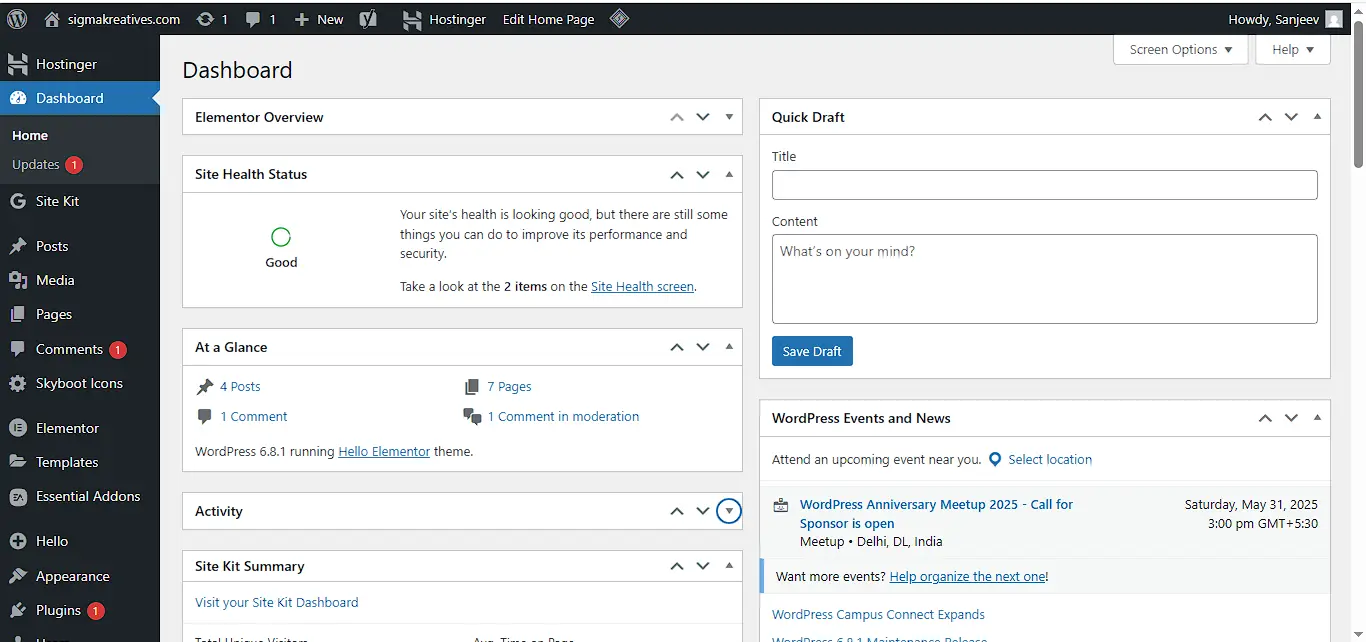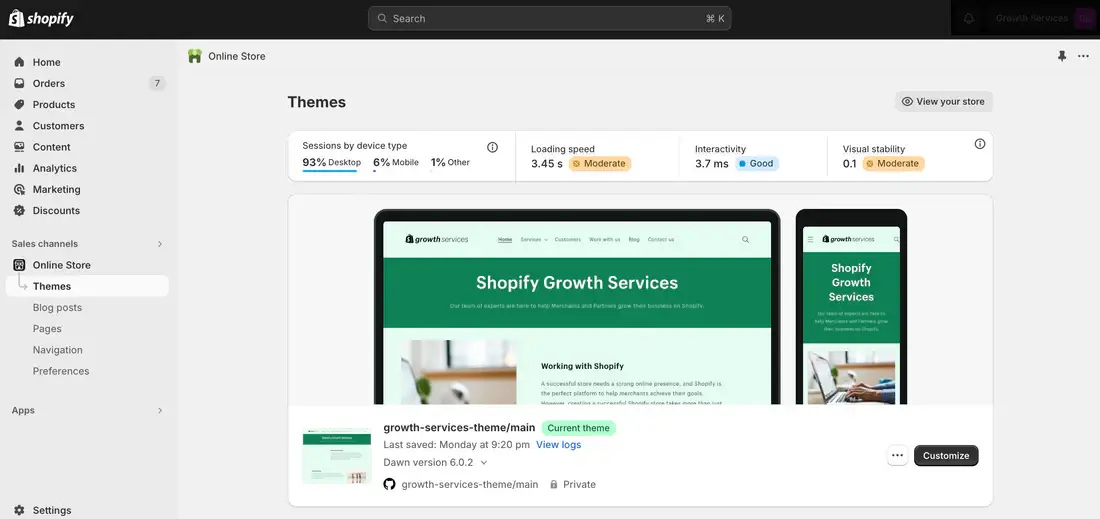Choosing the right platform for your small business website is one of the most important decisions you’ll make when establishing an online presence. Among the top contenders are WordPress and Shopify—both are powerful platforms, yet they serve very different purposes. While Shopify is geared specifically toward eCommerce, WordPress offers a more flexible, content-first approach.
In this in-depth comparison of WordPress vs Shopify, we’ll look at features, pricing, ease of use, SEO, and scalability to help you determine the best platform for your small business in 2025.
Why the Platform You Choose Matters
Your website is often your first impression. For small businesses, it’s not just a brochure—it’s a storefront, lead generator, blog, portfolio, booking tool, and more. Whether you’re selling products, offering services, or showcasing your work, the right CMS (Content Management System) can save you time, money, and stress.
Understanding the Basics: WordPress vs Shopify

WordPress Dashboard
WordPress is a free, open-source CMS powering over 40% of all websites globally. With thousands of plugins and themes, it allows full control over design and functionality. While WordPress itself isn’t an eCommerce platform, you can add that functionality using plugins like WooCommerce. Also check: Why WordPress is better than other CMS
Shopify Dashboard
Shopify, on the other hand, is a dedicated eCommerce platform designed to make online selling easy. It handles hosting, security, and shopping cart features out of the box. While it’s more limited in terms of design freedom, it’s ideal for those who want a plug-and-play experience for an online store.WordPress vs Shopify: A Feature-by-Feature Comparison
| Feature | WordPress | Shopify |
|---|---|---|
| Hosting | Self-hosted (flexible, manual) | Hosted (built-in, worry-free) |
| Ease of Use | Moderate (learning curve) | Very easy (no technical skills) |
| Customization | Highly customizable | Limited but streamlined |
| eCommerce | WooCommerce or other plugins | Built-in, very user-friendly |
| SEO Capabilities | Excellent (via plugins like Yoast) | Good, but slightly limited |
| Payment Gateways | Wide variety via plugins | Integrated with Shopify Payments |
| Pricing Flexibility | Varies (can be low-cost) | Fixed monthly plans |
| Scalability | High, with right setup | High, but comes at a higher price |
| Support | Community + paid options | 24/7 dedicated support |
| Ideal Use Case | Content + custom sites + stores | Product-focused eCommerce stores |
WordPress for Small Business: Strengths and Weaknesses
One of the biggest advantages of WordPress is flexibility. You can create any type of website—from a blog to a portfolio, a corporate site, or even a full-fledged online store using WooCommerce. This makes WordPress perfect for small businesses that want more than just an online store.
You also have complete ownership of your content and site. Since WordPress is open-source and self-hosted, you’re not locked into one vendor.
However, the downside is that WordPress requires some technical knowledge. Setting up hosting, managing updates, and maintaining security are your responsibilities (unless you pay for managed WordPress hosting). Still, many developers and freelancers (like us at Sigma Kreatives) specialize in creating fully custom WordPress sites for small businesses.
Shopify for Small Business: Pros and Cons
Shopify is designed with eCommerce at its core, making it perfect for businesses that want to start selling quickly. Its user-friendly interface allows anyone to launch a store in just a few hours.
Everything from hosting to SSL to checkout pages is included—making it a true all-in-one platform. For small business owners who don’t want to deal with tech, this is a huge plus.
But Shopify has its limits. Customization beyond the provided templates can be tricky without hiring a developer. You’re also subject to monthly fees and transaction fees unless you use Shopify Payments. If your business model includes more than just eCommerce—like content marketing or service booking—Shopify can feel limiting.
SEO: WordPress vs Shopify for Organic Growth
Search engine visibility is crucial for small businesses trying to compete online. WordPress has the upper hand here thanks to plugins like Yoast SEO, Rank Math, and All in One SEO, which allow you to manage every aspect of your site’s SEO—from schema to meta tags to advanced redirects.
Shopify does provide basic SEO features, but custom control is more limited. URL structures are not always clean, and there’s less control over schema markup and indexing.
If your growth strategy includes blogging, SEO, and inbound traffic, WordPress is the winner.
Design and Themes
WordPress has thousands of free and premium themes, plus support for builders like Elementor, Bricks, or Beaver Builder. That means nearly unlimited design freedom—even without coding.
Shopify has a more curated set of themes, and while they’re beautiful and optimized for conversions, deep customization often requires knowledge of Liquid (Shopify’s templating language).
Pricing: Which Is More Affordable?
Shopify plans start at $29/month and go up depending on features and volume. These costs are predictable, but they add up—especially if you pay for add-ons or themes.
With WordPress, you can start for less than $5/month using shared hosting, though prices vary based on your theme, plugins, and hosting provider. Over time, WordPress can be more cost-effective, especially for content-heavy sites that don’t need advanced commerce features.
When to Choose WordPress vs Shopify
Here’s a quick breakdown:
- Choose WordPress if you need full design flexibility, blogging, custom features, or want full control over SEO and hosting.
- Choose Shopify if your primary goal is to sell physical or digital products and you want a quick, secure, and reliable way to run an online store.
Frequently Asked Questions
Is WordPress better than Shopify for small business?
Can I move from Shopify to WordPress later?
Which is more beginner-friendly: WordPress or Shopify?
Is Shopify good for SEO?
Final Thoughts: Which Platform Wins?
There’s no universal winner in the WordPress vs Shopify debate—it comes down to your business needs. Shopify is unbeatable for quick, clean online stores. WordPress wins if you’re looking for control, scalability, and a content-driven approach.
At Sigma Kreatives, we recommend WordPress for small businesses that want long-term flexibility and SEO growth—but we’re happy to help you choose what works best for your unique goals.




